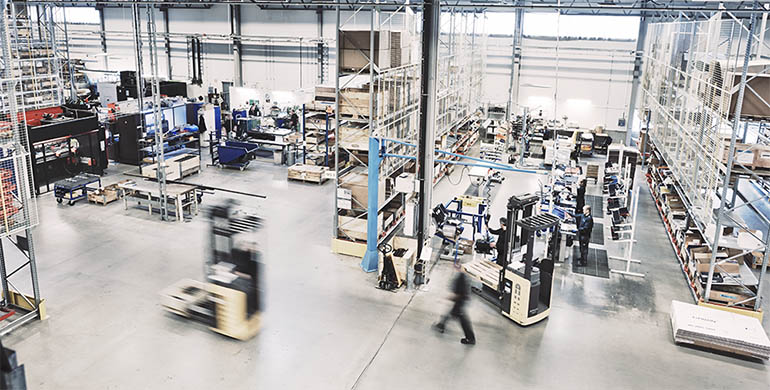Small productional changes with durable impact
We are always working to improve our operations and minimise our impact on the environment at our facilities. Through many small steps, we can make a difference and have an impact in the long run. These steps include: saving energy and resources, effective material and energy utilisation, waste management, and CO2 emissions measurement.
Examples of sustainability projects initiated by employees

For instance, a weekend cutoff time was proposed by colleagues at BraunAbility Europe's Swedish production site in 2023 to be put into practice for various machines and systems. This included the site's air compressor, indoor heating gates, laser machines, cooling system, and ventilation fans for laser cooling units. We were able to save a significant amount of energy within the production circle by cutting off power instead of putting it on standby on weekends. Thanks to our production team, we've saved a lot of energy. Starting in 2023, by cutting power to machines on weekends, including air compressors and laser machines, we saved 1.4 MWh compared to a typical week.
Another example from the same year was when we changed our air and noise management systems. We could greatly improve energy use and save costs by reducing annual energy consumption by 122 MWh. Additionally, by installing a new system in our air compressor, we were able to reduce inefficient air usage and waste during production. We have also made improvements to our air blow gun. This has resulted in a 50% reduction in noise and a 35% reduction in air consumption.
We continue to optimise our process flow while exploring ways to save energy and reuse resources. Here are some other examples of on-site improvements and small yet significant steps towards greater sustainability:
- Reducing handwashing water usage by up to 85%.
- Minimising plastic packaging waste: plastic recycling program, improved instructions, and supplier collaboration.
- Installing automatic sensor lights and LED lights to save energy.
Key sustainability initiatives 2024 – 2026
Between the years 2024 and 2026, several key initiatives lead the way towards enhancements in efficiency, sustainability, and innovation. These span across different parts of our organisation and focus on improving product development, documentation processes, and environmental impact.
To give you a clearer understanding, let us break it down into two levels:
Process level: Optimise energy processes to save energy and resources, reduce waste, and implement smarter process improvements. This benefits our organisation and workplace by creating a more efficient work environment.
Product level: We are committed to developing lighter products and future products that are easy to sort. The aim is to reduce material usage and simplify the handling and recycling of products. Among other things, product development will concentrate on reducing welding for health and energy reasons.
2024
- We continued expanding our convenient EV charging facility, allowing employees to charge their cars.
- The external finished goods inventory is closed. Logistics and operations at the new warehouse have become more efficient and cost-effective, resulting in a positive environmental impact.
- As part of our efforts for ISO 1421, we intensified our work in measuring recycling and operational waste at our production facilities in both Sweden and Denmark.
- Both our Danish and Swedish production sites are powered by 100% certified green energy obtained from accredited local hydro power providers.
2025
- Developing new products with less welding and more assembled solutions (as part of the Scope 1 & 2 plans).
- Transitioning product documentation to QR codes instead of paper.
- Introducing food waste sorting in the lunchroom.
- Setting new goals and action plans to reduce operational waste and issuing 'credit notes' for collaboration with suppliers handling recycling and waste.
Learn more about the history of our organisation and facilities